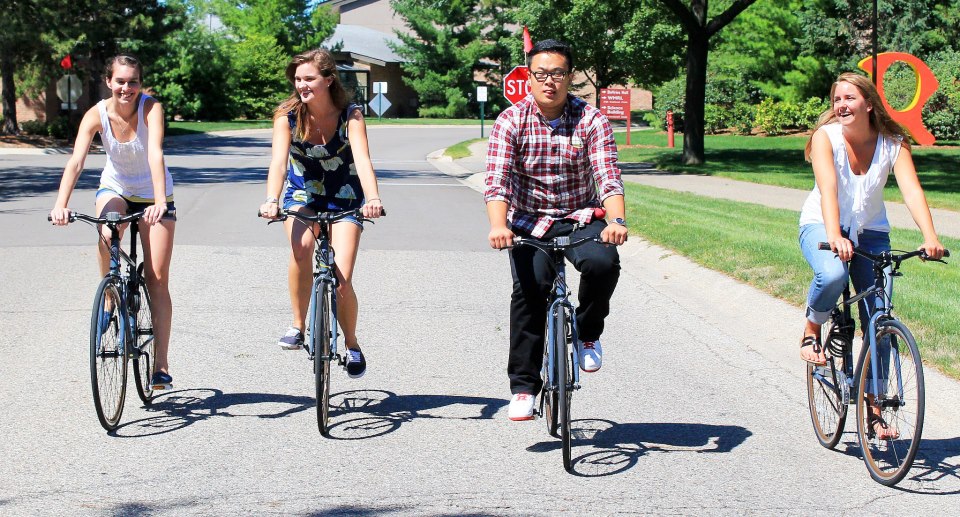Student senate’s current Rent-A-Bike program is thriving now, but it wasn’t always a smooth ride. Its success is built on lessons learned from mistakes in a disappointing initial attempt.
In the fall of 2010, a new idea was launched onto Calvin’s campus in the shape of 40 yellow bicycles. Calvin has a thriving bicycling community, but there are quite a few students who are unable to participate because they do not have means of attaining a bicycle, especially the nearly 50 percent out-of-state students. Student senate wanted to help these students, because it was a great way to promote community and health at the same time. The original system had 40 bicycles spread all over campus which students could ride these bikes to whatever destination on campus. Then, a different student could pick up the same bike and peddle to their own destination. This was the intended cycle, in an ideal situation.
However, the idea met with harsh reality. After two weeks, the donated bicycles started to break. Students, instead of turning these broken bicycles in, began to abuse them. Bikes were found in trees, in the seminary pond and on the roof of the fieldhouse. After only a month of launching the program, the student senate had no choice but to shut it down.
“Community ownership failed. Senate chose to trust the Calvin community to take care of the bikes. This trust was sorely abused,” said Josiah Sinclair, one of the program’s original founders.
It would have been easy to give up and scrap the whole program as a failure. However, student senate saw the good that this program could do. Senators decided to learn from their mistakes and make the program better. They purchased 80 bicycles from Ascent Cycle that had super-durable tires and no quick release or multiple gears. Instead of leaving the bicycles randomly all over campus, they installed a system of signing up for membership into the Rent-A-Bike program to promote responsibility. Also, they split up the bicycles in two different ways: 50 short-term, 24 hour-long rental bicycles, and 30 long-term bicycles, available for a semester long rental.
They relaunched the bike program in the fall of 2011 with all the new improvements. It had an overwhelming positive response. Nearly 150 students joined the program, and the bicycles were better taken care of. “The bike program has the potential to be a huge experience molder here at Calvin College. This isn’t the first we’ve tried the bike program, but we’ve learned from our mistakes, and [we] are still learning,” said Sinclair.
The constant evolution of the program is evident by the small changes they made this year to make the program even better. The overwhelming popularity of the long-term bicycles revealed to the senate that maybe it would be better if they had more long-term bicycles than short-term bicycles. This year, they reorganized the number of long-term and short-term bikes, making the count 55 long-term bicycles and 20 short-term bicycles.
“We also revised our policy for stolen bikes so that students who locked a bike up and had the cable cut and who file a police report immediately pay a reduced fee to replace the bike, rather than paying the full price for replacement,” stated David B. Witwer, the current head of the Rent-A-Bike program.
The popularity and success of the program is evident in just the numbers alone. Witwer accounts, “I don’t currently know how many students are in the short-term program since they can sign up at any one of the four short-term rental stations: student senate office, library, fieldhouse and [Knollcrest East’s] Theta-Epsilon … By my count there are 37 students with long-term bikes at the moment. I have about 16 names who have shown interest in bikes and hopefully in the next week all 55 bikes will be rented out.”
And the program’s evolution is continuing even now, Sinclair said. “We are thinking a lot about changes to the short-term program, like extending the duration of a rental from one day to several. We want to make that program better geared toward occasional bike users.”









